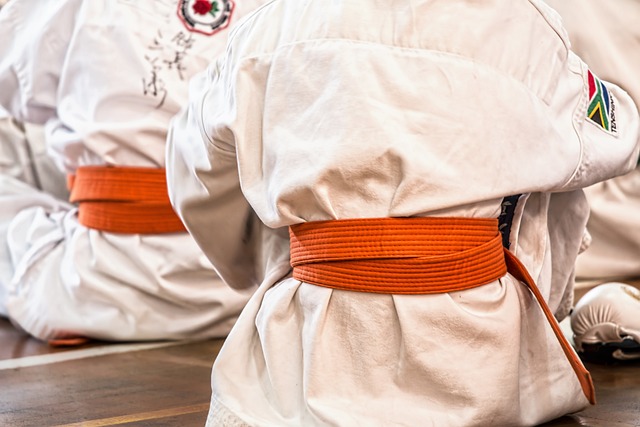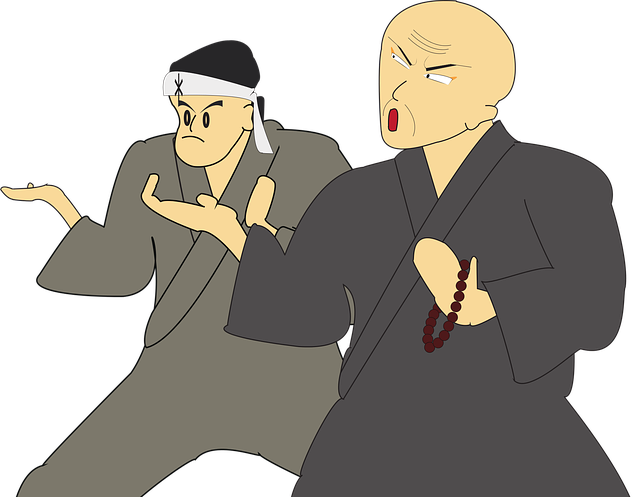To effectively train Karate at home, it's crucial to create a dedicated space that accommodates all necessary movements and ensures safety. Invest in essential gear like a heavy bag for striking practice, focus mitts or pads for partner drills, and a wall bag for knee and elbow strikes. A Makiwara board can aid in building hand strength and precision for punching. Complement this with balance training tools such as wobble boards or BOSU balls to enhance stability and coordination. For practicing Kata, which simulate combat with an imaginary opponent, utilize a combination of mirrors and online resources to monitor form and alignment, focusing on foundational stances and movements before advancing to more complex maneuvers. As you progress, refine fluidity, precision, and power in your movements to develop muscle memory, balance, and coordination. Advanced practitioners should consider adding focused sparring sessions with proper protective gear to their regimen for real-life combat scenarios and performance analysis. To support a balanced training routine, incorporate strength training with dumbbells or resistance bands, endurance exercises like running or cycling, and rotate between high-intensity interval training and steady-state cardio, ensuring adequate rest for muscle recovery. Regularly updating your equipment, particularly from specialized retailers that offer Karate gear, is key to advancing your skills and preparing for higher levels of competition or personal achievement in the comfort of your own home environment. Remember to buy karate equipment tailored to your specific training needs for a comprehensive and effective practice routine.
Interested in honing your karate skills from the comfort of your own home? Our comprehensive guide on training karate at home covers everything from setting up a dedicated space and acquiring essential equipment—like what you can find when you buy karate equipment—to mastering kata and advancing your techniques. Whether you’re a beginner or an experienced practitioner looking to refine your form, this article provides step-by-step instructions for perfecting your moves and offers expert tips on sparring, strength building, and endurance training. Elevate your practice and achieve your martial arts goals without ever leaving your house.
- Setting Up Your Home Karate Gym: Essential Equipment and Space Considerations
- Mastering Karate Kata at Home: Practice Techniques with Step-by-Step Instructions
- Advanced Training Tips: Sparring, Strength Building, and Endurance for Karate Practitioners at Home
Setting Up Your Home Karate Gym: Essential Equipment and Space Considerations

To effectively train Karate at home, setting up a dedicated space with appropriate equipment is paramount. Begin by designating an area that offers enough room for practicing kicks, punches, and forms without encountering obstacles. Ideally, this space should be free of hazards and have a soft, padded floor to cushion falls and protect joints. For floorwork, a tatami mat or similar matting can create a safe environment for practice. When considering equipment purchases, a heavy bag is an essential buy karate equipment piece for striking techniques, while a focus mitt or pad will be necessary for practicing combinations with a partner. Additionally, a wall bag can serve as a versatile tool for knee and elbow strikes. To simulate sparring, a Makiwara board can help harden the fist and improve punching power. Ensure you have enough wall space for this latter item. Balance training equipment, such as wobble boards or BOSU balls, can also be beneficial to improve stability and coordination. For blocking and striking practice against a stationary target, a karate target or focus mitt is useful. Remember to invest in a quality Gi for proper form practice and to mimic the feel of a dojo setting. By thoughtfully selecting and positioning these items, you can create an effective home Karate gym that supports a rigorous training regimen. With these considerations in mind, your home can become a sanctuary for honing your Karate skills.
Mastering Karate Kata at Home: Practice Techniques with Step-by-Step Instructions

To master the intricate movements of Karate Kata at home, practitioners can benefit from a structured approach to training. A fundamental aspect of Karate, Kata are sequences of movements that emulate defensive and offensive techniques against imaginary opponents. While practicing Kata requires attention to detail and consistency, it can be honed effectively in a personal space with the right guidance and equipment. Begin by creating a clear, spacious area in your home to minimize the risk of injury from furniture or other obstacles. Next, invest in quality Karate equipment, including a focus mitt or target for practicing strikes, and a mirror to check form and alignment.
Step-by-step instructions for each Kata can be found through various online resources or instructional videos, which are an excellent tool for learning when complemented by physical practice. It’s advisable to start with basic stances and movements, ensuring correct posture and technique before advancing to more complex maneuvers. Progress gradually, focusing on fluidity, precision, and power in your movements. By repeating the Kata sequences regularly, you’ll enhance your muscle memory, balance, and coordination. For those looking to enhance their training further, consider purchasing additional Karate gear such as a heavy bag or balance ball for improved strength and conditioning. With dedication and the right resources, practicing Karate Kata at home can be a rewarding experience that contributes significantly to your mastery of the art. Remember to stay consistent with your practice, and over time, you’ll see improvement in your technique and understanding of the Kata.
Advanced Training Tips: Sparring, Strength Building, and Endurance for Karate Practitioners at Home

To elevate your karate practice at home, especially for advanced practitioners, incorporating targeted sparring sessions is crucial. Set up a makeshift dojo with adequate space and ensure you have proper protective gear, which can be purchased online to safeguard both you and your training partner. Sparring not only sharpens your techniques but also improves reaction time, anticipation skills, and combat strategy. Use focused drills that mimic real-life encounters, working on both offensive and defensive maneuvers. Record your sparring sessions to analyze and refine your movements later.
Strength building and endurance are pivotal components of an advanced karate training regimen. Invest in a diverse set of karate equipment such as dumbbells, resistance bands, or a punching bag that can be found through reputable retailers specializing in martial arts gear. A balanced strength-training program targeting all major muscle groups will enhance your power and stability, while incorporating endurance exercises like running or cycling will bolster your stamina for longer bouts of karate practice. Design a rotating routine that includes both high-intensity interval training (HIIT) and steady-state cardio to maintain peak performance levels at home. Remember to integrate rest days to allow for muscle recovery and to prevent overtraining. By combining these advanced training tips with the purchase of suitable equipment, you can effectively refine your karate skills and prepare for higher-level competition or personal achievement in the comfort of your own home.
In conclusion, training karate at home is a rewarding endeavor that requires dedication, space, and the right equipment. By setting up a dedicated home karate gym with essential items readily available for purchase, you can master the intricate kata movements and progress to advanced techniques such as sparring, strength building, and endurance training. Whether you’re a beginner or an experienced practitioner, adhering to step-by-step instructions and incorporating these tips into your routine will enhance your practice and bring you closer to achieving karate mastery from the comfort of your own home. Remember to invest in quality karate equipment to support your training journey and ensure safety and effectiveness. With consistent effort and the right resources, your home can become a sanctuary for honing your karate skills and fostering discipline and focus.
